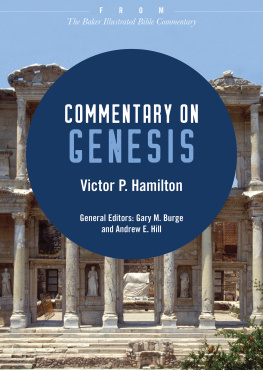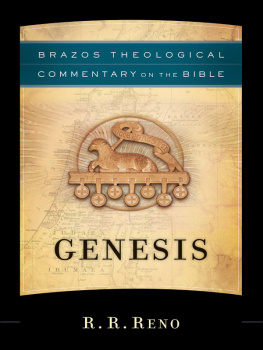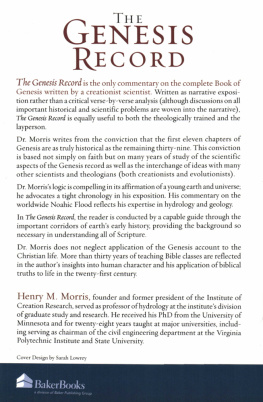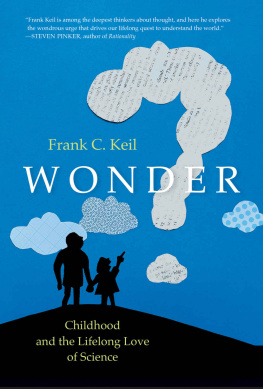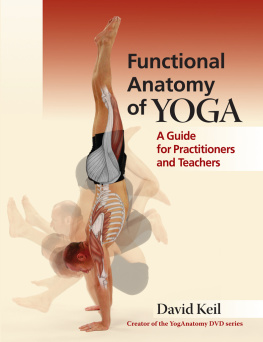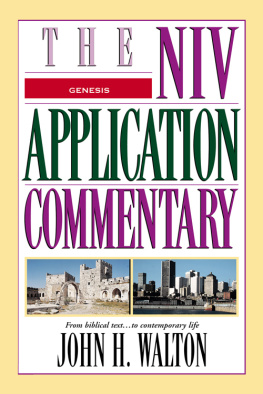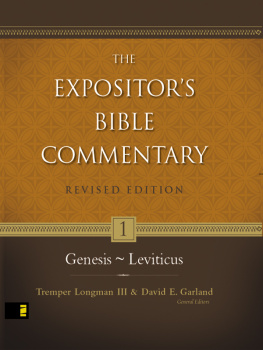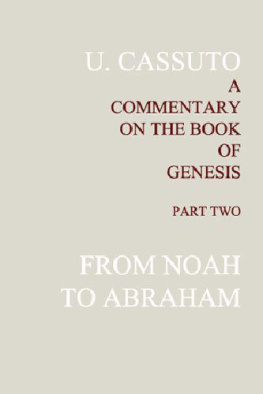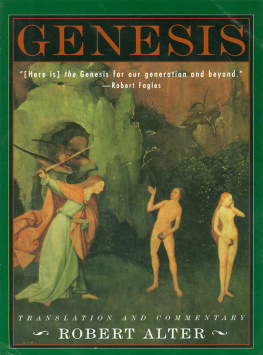C. F. Keil - Commentary on Genesis
Here you can read online C. F. Keil - Commentary on Genesis full text of the book (entire story) in english for free. Download pdf and epub, get meaning, cover and reviews about this ebook. year: 2014, genre: Religion. Description of the work, (preface) as well as reviews are available. Best literature library LitArk.com created for fans of good reading and offers a wide selection of genres:
Romance novel
Science fiction
Adventure
Detective
Science
History
Home and family
Prose
Art
Politics
Computer
Non-fiction
Religion
Business
Children
Humor
Choose a favorite category and find really read worthwhile books. Enjoy immersion in the world of imagination, feel the emotions of the characters or learn something new for yourself, make an fascinating discovery.

- Book:Commentary on Genesis
- Author:
- Genre:
- Year:2014
- Rating:4 / 5
- Favourites:Add to favourites
- Your mark:
- 80
- 1
- 2
- 3
- 4
- 5
Commentary on Genesis: summary, description and annotation
We offer to read an annotation, description, summary or preface (depends on what the author of the book "Commentary on Genesis" wrote himself). If you haven't found the necessary information about the book — write in the comments, we will try to find it.
Commentary on Genesis — read online for free the complete book (whole text) full work
Below is the text of the book, divided by pages. System saving the place of the last page read, allows you to conveniently read the book "Commentary on Genesis" online for free, without having to search again every time where you left off. Put a bookmark, and you can go to the page where you finished reading at any time.
Font size:
Interval:
Bookmark:
C. F. Keil and Franz Delitzsch
Contents, Design, and Plan of the Book of Genesis
The first book of Moses, which has the superscription in the original, in the Cod. Alex. of the lxx, and is called liber creationis by the Rabbins, has received the name of Genesis from its entire contents. Commencing with the creation of the heaven and the earth, and concluding with the death of the patriarchs Jacob and Joseph, this book supplies us with information with regard not only to the first beginnings and earlier stages of the world and of the human race, but also to those of the divine institutions which laid the foundation for the kingdom of God. Genesis commences with the creation of the world, because the heavens and the earth form the appointed sphere, so far as time and space are concerned, for the kingdom of God; because God, according to His eternal counsel, appointed the world to be the scene both for the revelation of His invisible essence, and also for the operations of His eternal love within and among His creatures; and because in the beginning He created the world to be and to become the kingdom of God. The creation of the heaven and the earth, therefore, receives as its centre, paradise; and in paradise, man, created in the image of God, is the head and crown of all created beings. The history of the world and of the kingdom of God begins with him. His fall from God brought death and corruption into the whole creation (Genesis 3:17.; Romans 8:19.); his redemption from the fall will be completed in and with the glorification of the heavens and the earth (Isaiah 65:17; Isaiah 66:22; 2 Peter 3:13; Revelation 21:1). By sin, men have departed and separated themselves from God; but God, in His infinite mercy, has not cut himself off from men, His creatures. Not only did He announce redemption along with punishment immediately after the fall, but from that time forward He continued to reveal Himself to them, that He might draw them back to Himself, and lead them from the path of destruction to the way of salvation. And through these operations of God upon the world in theophanies, or revelations by word and deed, the historical development of the human race became a history of the plan of salvation. The book of Genesis narrates that history in broad, deep, comprehensive sketches, from its first beginning to the time of the patriarchs, whom God chose from among the nations of the earth to be the bearers of salvation for the entire world. This long space of 2300 years (from Adam to the flood, 1656; to the entrance of Abram into Canaan, 365; to Joseph's death, 285; in all, 2306 years) is divisible into two periods. The first period embraces the development of the human race from its first creation and fall to its dispersion over the earth, and the division of the one race into many nations, with different languages (2:4-11:26); and is divided by the flood into two distinct ages, which we may call the primeval age and the preparatory age. All that is related of the primeval age, from Adam to Noah, is the history of the fall; the mode of life, and longevity of the two families which descended from the two sons of Adam; and the universal spread of sinful corruption in consequence of the intermarriage of these two families, who differed so essentially in their relation to God (2:4-6:8). The primeval history closes with the flood, in which the old world perished (6:9-8:19). Of the preparatory age, from Noah to Terah the father of Abraham, we have an account of the covenant which God made with Noah, and of Noah's blessing and curse; the genealogies of the families and tribes which descended from his three sons; an account of the confusion of tongues, and the dispersion of the people; and the genealogical table from Shem to Terah (8:20-11:26).
The second period consists of the patriarchal era. From this we have an elaborate description of the lives of the three patriarchs of Israel, the family chosen to be the people of God, from the call of Abraham to the death of Joseph (11:27-50:26). Thus the history of humanity is gathered up into the history of the one family, which received the promise, that God would multiply it into a great people, or rather into a multitude of peoples, would make it a blessing to all the families of the earth, and would give it the land of Canaan for an everlasting possession.
This general survey will suffice to bring out the design of the book of Genesis, viz., to relate the early history of the Old Testament kingdom of God. By a simple and unvarnished description of the development of the world under the guidance and discipline of God, it shows how God, as the preserver and governor of the world, dealt with the human race which He had created in His own image, and how, notwithstanding their fall and through the misery which ensued, He prepared the way for the fulfillment of His original design, and the establishment of the kingdom which should bring salvation to the world. Whilst by virtue of the blessing bestowed in their creation, the human race was increasing from a single pair to families and nations, and peopling the earth; God stemmed the evil, which sin had introduced, by words and deeds, by the announcement of His will in commandments, promises, and threats, and by the infliction of punishments and judgments upon the despisers of His mercy. Side by side with the law of expansion from the unity of a family to the plurality of nations, there was carried on from the very first a law of separation between the ungodly and those that feared God, for the purpose of preparing and preserving a holy seed for the rescue and salvation of the whole human race. This double law is the organic principle which lies at the root of all the separations, connections, and dispositions which constitute the history of the book of Genesis. In accordance with the law of reproduction, which prevails in the preservation and increase of the human race, the genealogies show the historical bounds within which the persons and events that marked the various epochs are confined; whilst the law of selection determines the arrangement and subdivision of such historical materials as are employed.
So far as the plan of the book is concerned, the historical contents are divided into ten groups, with the uniform heading, These are the generations (with the exception of Genesis 5:1: This is the book of the generations); the account of the creation forming the substratum of the whole. These groups consist of the (Tholedoth): 1. of the heavens and the earth (Gen 2:4-4:26); 2. of Adam (Gen 5:1-6:8); 3. of Noah (Gen 6:9-9:29); 4. of Noah's sons (Gen 10:1-11:9); 5. of Shem (Gen 11:10-26); 6. of Terah (Gen 11:27-25:11); 7. of Ishmael (Genesis 25:12-18); 8. of Isaac (Gen 25:19-35:29); 9. of Esau (Gen 26); and 10. of Jacob (Gen 37-50). There are five groups in the first period, and five in the second. Although, therefore, the two periods differ considerably with regard to their scope and contents, in their historical importance to the book of Genesis they are upon a par; and the number ten stamps upon the entire book, or rather upon the early history of Israel recorded in the book, the character of completeness. This arrangement flowed quite naturally from the contents and purport of the book. The two periods, of which the early history of the kingdom of God in Israel consists, evidently constitute two great divisions, so far as their internal character is concerned. All that is related of the first period, from Adam to Terah, is obviously connected, no doubt, with the establishment of the kingdom of God in Israel, but only in a remote degree. The account of paradise exhibits the primary relation of man to God and his position in the world. In the fall, the necessity is shown for the interposition of God to rescue the fallen. In the promise which followed the curse of transgression, the first glimpse of redemption is seen. The division of the descendants of Adam into a God-fearing and an ungodly race exhibits the relation of the whole human race to God. The flood prefigures the judgment of God upon the ungodly; and the preservation and blessing of Noah, the protection of the godly from destruction. And lastly, in the genealogy and division of the different nations on the one hand, and the genealogical table of Shem on the other, the selection of one nation is anticipated to be the recipient and custodian of the divine revelation. The special preparations for the training of this nation commence with the call of Abraham, and consist of the care bestowed upon Abraham, Isaac, and Jacob, and their posterity, and of the promises which they received. The leading events in the first period, and the prominent individuals in the second, also furnished, in a simple and natural way, the requisite points of view for grouping the historical materials of each under a fivefold division. The proof of this will be found in the exposition. Within the different groups themselves the arrangement adopted is this: the materials are arranged and distributed according to the law of divine selection; the families which branched off from the main line are noticed first of all; and when they have been removed from the general scope of the history, the course of the main line is more elaborately described, and the history itself is carried forward. According to this plan, which is strictly adhered to, the history of Cain and his family precedes that of Seth and his posterity; the genealogy of Japhet and Ham stands before that of Shem; the history of Ishmael and Esau, before that of Isaac and Jacob; and the death of Terah, before the call and migration of Abraham to Canaan. In this regularity of composition, according to a settled plan, the book of Genesis may clearly be seen to be the careful production of one single author, who looked at the historical development of the human race in the light of divine revelation, and thus exhibited it as a complete and well arranged introduction to the history of the Old Testament kingdom of God.
Font size:
Interval:
Bookmark:
Similar books «Commentary on Genesis»
Look at similar books to Commentary on Genesis. We have selected literature similar in name and meaning in the hope of providing readers with more options to find new, interesting, not yet read works.
Discussion, reviews of the book Commentary on Genesis and just readers' own opinions. Leave your comments, write what you think about the work, its meaning or the main characters. Specify what exactly you liked and what you didn't like, and why you think so.

